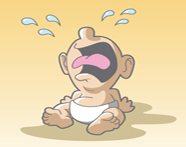Dealing with a Colicky Baby & Sleep Deprivation

Statistics say that 16-26 percent of babies have infant colic. If you are a mother to a colicky baby, you know you are more than just a statistic. Most likely, you’re a sleep-deprived mommy trying to deal with your child’s screaming fits and juggling your own needs with that of a crying baby. Though colic is usually defined by how long and for how many days a child cries, there is no real cause known for infant colic. Some say it’s gassiness, some are not sure of what causes this phenomenon, but one fact remains the same: no matter how hard you might try, nothing ceases your baby’s screaming, nor your stress in dealing with colic.
The old adage to sleep when your infant sleeps, especially during the first few weeks and months of your baby’s life, is essential to any mom and dad of a colicky baby. Whether it’s during the day or at night, try to get some shuteye when your baby does. This not only gives you much-needed rest, it also recharges you mentally so you can later deal with your child’s colic and crying.
One thing to try while your baby is screaming during their colic bouts is to swaddle them tightly and hold them close to you, gently swinging back and forth to mimic the motions of being in utero. This trick might not completely halt your child’s crying, but it can soothe them and comfort them during this time, and sometimes it does work to stop their crying.
Another trick is to drive them around in a vehicle. I don’t know why this works, but it seemed to work for my sister-in-law. For my child it never worked, but it is something to try. Also, try an over-the-counter gas medicine, made just for infants. One such medicine I used with good results in my child was Mylicon drops. Sometimes it was hit or miss, but for the most part it seemed to help my daughter.
If your baby is bottle-fed, try to reduce the amount of air your baby ingests by using special bottles with a curve or with a plastic insert. I used the Playtex kind with the plastic inserts that work more like the breast and it worked well for my daughter. If your child is breast-fed, watch your dairy intake, and also watch your ingestion of onions, caffeine, spicy foods and beans. Remember, when breastfeeding, what you eat goes into your child via your breastmilk.
Make sure to burp your baby well after nursing/bottle feeding. Air trapped in your baby’s tummy can cause pain and gas, leading to more crying. You can also try giving your child a warm bath or apply a warm (not hot) cloth to your child’s tummy for heat therapy.
Utilizing these steps can definitely help to soothe your colicky child and allow you some relief as well. Ask your pediatrician for other remedies as well, and talk to them about your child’s crying, sleep schedule and eating patterns. Another important tip is to reach out to other parents dealing with the same symptoms and see how they coped with their child’s colic, gassiness or crying bouts. Just knowing you’re not alone can go a long way to ease your mind and reassure yourself that you’re doing everything you can to comfort your colicky baby.
Kristina Wyatt is a SAHM to a 16-month old daughter, married for 11 years who enjoys scrapbooking, writing and reading mysteries. Her daughter Makenna is the love of her life and she enjoys writing parenting articles to help parents with their toddlers and all the joys of having a growing child!





